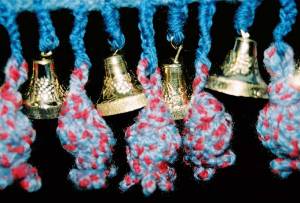
By Rabbi Ari Enkin, Rabbinic Director, United with Israel
If courtesy for others was an important value shared by the holiest man in the world in the holiest place in the world, then certainly it should occupy a prominent place in our world.
This week’s Torah portion is Tetzaveh (Exodus 27:20 – 30:10), and among the things we read about is the clothing of the High Priest, the Kohen Gadol.
One of the garments that the High Priest wore was a royal, four-cornered blue robe. The bottom was decorated with “golden pomegranates” and bells. Our sages tell us that the bells were a vital part of the robe, and in fact, a High Priest whose robe did not have the required bells was subject to the death penalty! The bells were necessary so that “its sound should be heard when he [the High Priest] enters the Sanctuary before God.”
As the Talmud elaborates, the bells teach us a basic lesson in decency and manners: that we must give warning or otherwise announce our arrival before entering a room. Proper etiquette is to knock on a door before entering. Just as the bells announced the High Priest’s arrival in the Sanctuary and the Holy of Holies, so too must we announce ourselves wherever we go and not barge in unexpectedly. This is true even in our own homes! The Talmud tells us that we should knock or ring the bell before we enter our own home in order that the members of our household are aware of our arrival. (Yes, I do it!)

The priestly garments in the Holy Temple included bells to inform of his entrance. (templeinstitute.org)
The question is asked, however. Why does God need to know that the High Priest is entering the Holy of Holies? Doesn’t He already knows! Does God really need the bells to tell Him that the High Priest has arrived?
Of course not! So, while the lesson in manners and decency is an important one, why is the lesson connected specifically with the robe of the High Priest? There are many other episodes in the Torah where the importance of knocking before entering a room could have been taught.
It is explained that there is no better place to teach a lesson in basic manners than in connection with the holiest of people and places. This added fact is to teach us that we must not forget basic manners in our pursuit of holiness and other lofty goals. No matter what the goal is, we must abide by decency along the way. Even the High Priest was forced to comply with the etiquette of making his presence known upon arrival in the Holy Temple and in the Holy of Holies, even though God didn’t need the extra reminder.
In our own lives, we often get caught up in, well, life. The busy life. The rushed life. The pressured life. Unfortunately, this often leads us to neglect basic decency and courtesy. For example, when we are late for an appointment, we might rationalize driving a little faster or more aggressively. Let us remember, therefore, that if courtesy was an important value shared by the holiest man in the world in the holiest place in the world, then certainly it should occupy a prominent place in our world!
For more insight on this week’s Torah portion, click on the links below:
https://unitedwithisrael.org/clothes-make-the-man-or-do-they/
https://unitedwithisrael.org/living-torah-building-an-inner-sanctuary/
Do You Love Israel? Make a Donation - Show Your Support!
Donate to vital charities that help protect Israeli citizens and inspire millions around the world to support Israel too!
Now more than ever, Israel needs your help to fight and win the war -- including on the battlefield of public opinion.
Antisemitism, anti-Israel bias and boycotts are out of control. Israel's enemies are inciting terror and violence against innocent Israelis and Jews around the world. Help us fight back!























